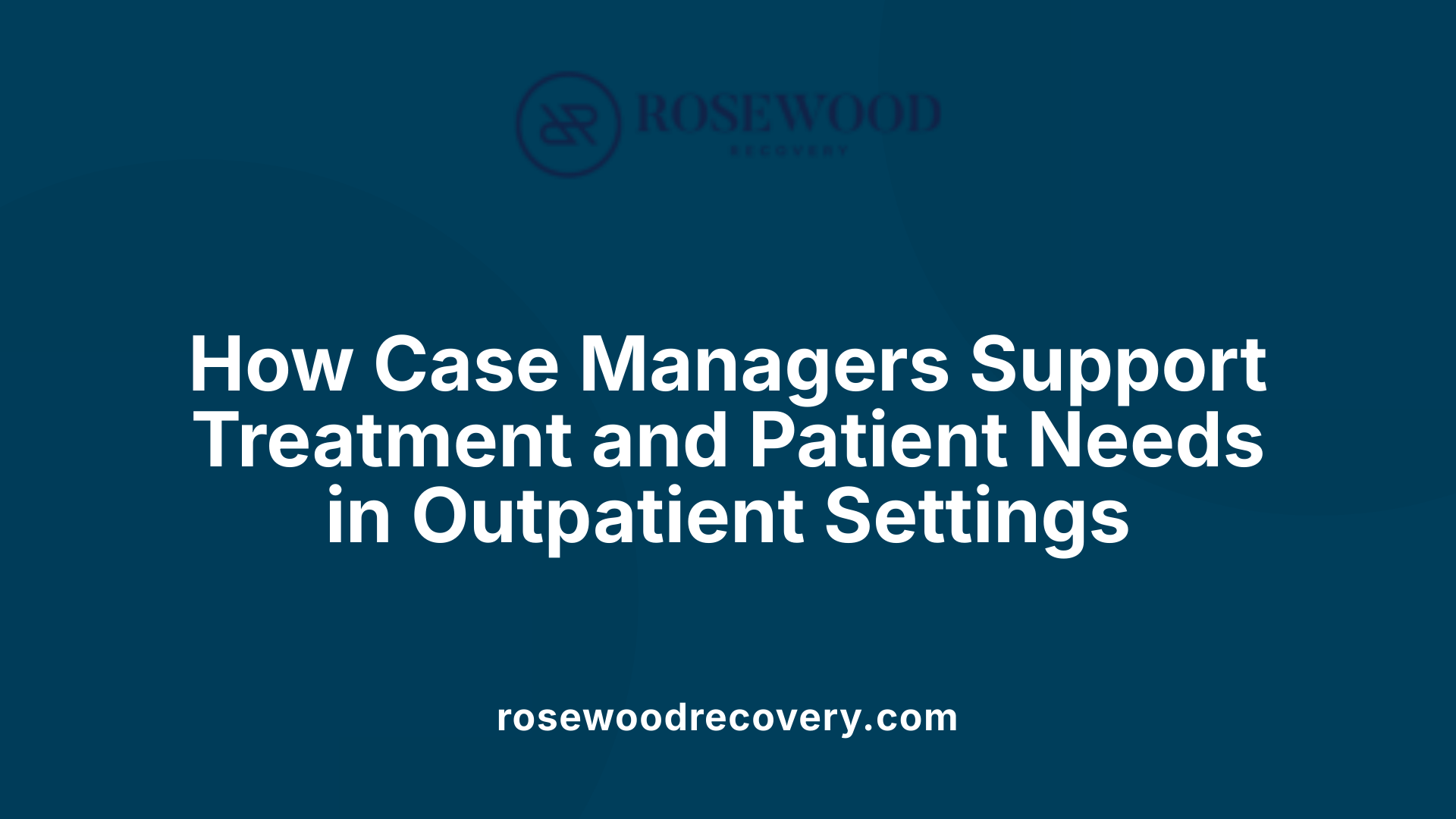Understanding the Crucial Role of Case Managers in Outpatient Settings
In outpatient treatment environments, case managers serve as vital bridges between patients and the multitude of healthcare, social, and community resources necessary for comprehensive care. Their role extends beyond simple coordination to encompass advocacy, education, and personalized support, ensuring that each patient’s unique needs are met efficiently and effectively. This article explores the multifaceted responsibilities of case managers in outpatient settings, shedding light on how their work significantly impacts treatment outcomes, patient wellness, and healthcare system efficiency.
Core Responsibilities and Functions of Outpatient Case Managers

What are the core components and functions of case management in outpatient care?
In outpatient settings, case management revolves around several fundamental activities designed to support patients with complex health needs. The process begins with patient assessment, where case managers identify individual needs, strengths, and barriers to care. This assessment allows for a tailored approach to healthcare planning.
Following this, case managers develop specific, individualized care plans that outline the patient's health goals and the necessary services to meet those goals. These plans serve as a roadmap, detailing treatment strategies, resource linkages, and action steps.
A crucial aspect of outpatient case management is service coordination, where case managers connect patients with appropriate healthcare providers, community resources, and support services. This linkage ensures comprehensive care that addresses both clinical and social determinants of health.
Once the care plan is in place, case managers oversee its implementation, regularly monitoring progress through follow-up assessments and adjustments as needed. They evaluate outcomes to measure success and identify areas for improvement.
In addition to logistical coordination, advocacy and education form core functions, empowering patients to understand their conditions and navigate healthcare systems effectively. Transitional planning supports patients moving between care settings, facilitating smooth hospital-to-home transitions and preventing readmissions.
Overall, outpatient case management is a collaborative, ongoing process. It aims to enhance patient engagement, improve health outcomes, and ensure the most efficient use of healthcare resources. By fostering clear communication among providers and supporting patient self-management, case managers play a vital role in delivering patient-centered care that meets each individual’s unique needs.
Practices and Models of Case Management in Outpatient and Community Settings
 Case management in outpatient rehabilitation and substance use disorder treatments employs various models designed to meet the diverse needs of patients. Among these, brokerage, assertive community treatment, and clinical or rehabilitation models stand out as common frameworks.
Case management in outpatient rehabilitation and substance use disorder treatments employs various models designed to meet the diverse needs of patients. Among these, brokerage, assertive community treatment, and clinical or rehabilitation models stand out as common frameworks.
The brokerage model acts as a facilitator, linking patients with vital health services, social resources, and community programs. It emphasizes resource connection and service coordination without directly providing clinical care.
Assertive community treatment (ACT), on the other hand, is a more intensive, multidisciplinary approach. It involves a team of healthcare professionals working collaboratively to deliver comprehensive, personalized care directly within the community. This model is especially beneficial for individuals with severe mental health or complex social needs, aiming to promote independence and reduce hospitalizations.
The clinical or rehabilitation model focuses on structured treatment plans, often integrating disease management principles. It involves clinical assessments, tailored care planning, ongoing monitoring, and support for recovery goals.
These models are applied across various healthcare environments, including outpatient clinics, mental health facilities, substance use treatment centers, and community-based programs. They often involve team-based approaches where nurses, social workers, counselors, and physicians collaborate to deliver holistic care.
Overlap exists between case management, care coordination, and disease management, but each maintains distinct roles. Case management primarily facilitates access, advocates, and coordinates services to ensure comprehensive care. Care coordination emphasizes organizing providers' efforts to deliver seamless treatment. Disease management concentrates on specific chronic conditions, employing specialized interventions and monitoring.
Implementing these models effectively requires multidisciplinary teams that tailor interventions to individual needs, considering social determinants of health and cultural factors. They are pivotal in addressing complex health and social issues, ultimately aiming to improve overall outcomes for patients in outpatient and community settings.
The Significance of Case Management in Enhancing Outpatient Healthcare Outcomes

Why is case management important in outpatient healthcare?
Case management is essential in outpatient settings because it promotes coordinated and continuous care tailored to each patient's unique needs. It helps patients and their families understand complex healthcare systems, identify appropriate services, and stay on track with treatment plans.
A case manager serves as a central point of contact, facilitating communication among patients, healthcare providers, and community resources. They assess individual needs, develop personalized care plans, and monitor progress over time.
This proactive approach supports better management of chronic or complex health conditions, improving patient engagement and overall health outcomes. By addressing social determinants of health and potential barriers, case managers help ensure that care is accessible and relevant.
Moreover, effective case management contributes to reducing unnecessary hospital admissions and emergency visits, leading to cost savings for the healthcare system. It also enhances patient satisfaction by providing guidance, advocacy, and ongoing support.
In summary, outpatient case management plays a vital role in delivering patient-centered, efficient, and safe healthcare, ultimately leading to improved quality of life, better adherence to treatment, and optimized use of healthcare resources.
Facilitating Treatment and Addressing Patient Needs in Outpatient Care

How do case managers facilitate treatment processes and address patient needs in outpatient care?
Case managers serve as essential coordinators and advocates in outpatient healthcare settings, helping patients navigate complex medical systems and personal challenges. They first conduct comprehensive assessments that explore the patient's physical health, mental state, social circumstances, and support networks. This enables them to understand individual needs thoroughly.
Based on this assessment, case managers develop personalized and adaptable treatment plans. These plans set clear goals for health management and include specific steps the patient can take. As the patient's situation evolves, case managers monitor progress and modify plans to improve adherence and outcomes.
Supporting patient engagement is a core task. Case managers help overcome common barriers like transportation issues, housing instability, or language barriers by connecting patients with community resources and ensuring logistical support.
They also play a critical role in advocating for patients, ensuring they receive appropriate services promptly. This includes coordinating among healthcare providers, specialists, and community organizations to maintain seamless care.
Transitions between different care settings—such as from hospital to home—are often fraught with challenges. Case managers facilitate these movements by developing detailed discharge plans, arranging follow-up services, and educating patients about their ongoing care needs.
Through ongoing communication, trust-building, and motivational support, case managers empower patients to actively participate in their recovery. Their involvement promotes better adherence to treatment regimens, enhances health outcomes, and supports patients in gaining independence and wellness.
Discharge Planning, Community Linkage, and Recovery Support
What specific responsibilities do case managers have in patient care, discharge planning, and linking patients to community resources?
Case managers hold a pivotal role in ensuring that patients transition smoothly from one care setting to another, especially at discharge. Their responsibilities include assessing each patient’s healthcare and social needs, developing tailored care plans, and coordinating services among different healthcare providers. During discharge planning, they prepare patients for returning home by organizing follow-up appointments, arranging necessary medical equipment, and ensuring medication management is understood.
Beyond inpatient settings, case managers connect patients with vital community resources such as support groups, counseling services, home health care, and social support agencies. They serve as advocates, helping patients navigate complex healthcare systems, understand their health conditions, and access benefits like insurance or social services.
Their role extends to educating patients about managing their health, promoting safety, and preventing readmissions. By facilitating communication among providers and community resources, case managers help sustain ongoing recovery efforts. This comprehensive approach aims to enhance patient safety, improve health outcomes, and ensure an efficient use of healthcare resources, thereby supporting long-term health maintenance and reducing the risk of relapse.
Enhancing Outcomes and Patient Wellness Through Effective Case Management
In outpatient treatment settings, case managers are indispensable for delivering holistic, patient-centered care. Their expert coordination, advocacy, and support facilitate seamless treatment processes, improve health outcomes, and promote long-term recovery. By addressing both clinical and social determinants of health, they play a crucial role in navigating complex healthcare environments, ensuring that patients receive timely, appropriate, and comprehensive care. The ongoing value of dedicated case management underscores its importance in achieving efficient, cost-effective, and compassionate outpatient healthcare systems, ultimately empowering patients to attain wellness and independence.
References
- Case Management - StatPearls
- What is a Case Manager? | CMSA
- Rehabilitation Case Manager
- Background - Outpatient Case Management for Adults With ...
- The Role of the Case Manager
- Case Management - Carl R. Darnall Army Medical Center
- COMPREHENSIVE CASE MANAGEMENT FOR ...
- The Role of Case Management in Your Recovery
- Outpatient Case Management/Gender Health Referrals




